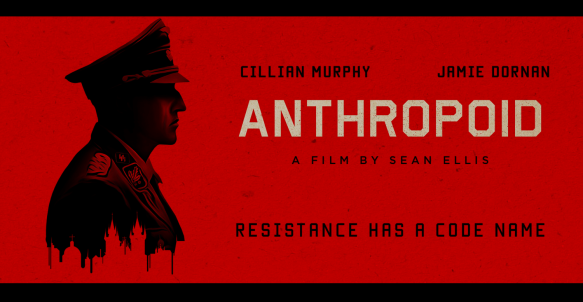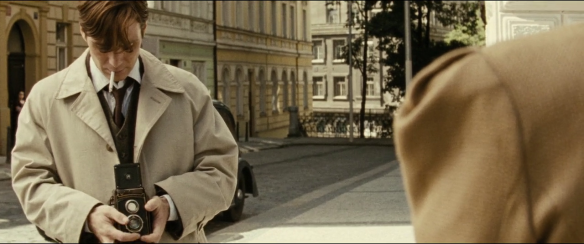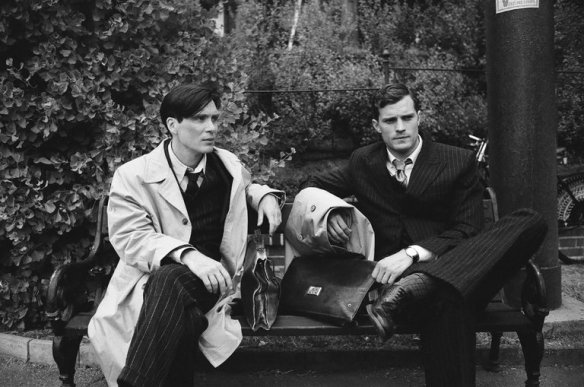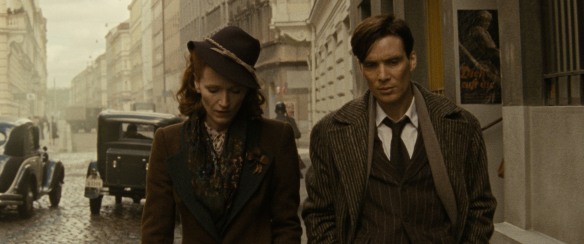In 1942, a group of Czechoslovak soldiers carried out Operation Anthropoid, an attempt to assassinate Reinhard Heydrich, upon the orders of the Czechoslovak government in exile. Heydrich, being one of the most powerful men within the Nazi ranks, was also known as the Butcher of Prague—a moniker earned for his merciless reign of discipline in the city of the occupied country. The operation succeeded, after Heydrich was wounded and died in the hospital a few days afterwards. The retaliation from the German forces were severe; entire villages and groups of people massacred for the life of the man behind the Final Solution.

Anthropoid tells the story of the assassination through the eyes of the two key figures behind the operation, Jozef Gabčík (played by Cillian Murphy) and Jan Kubiš (played by Jamie Dornan). Sean Ellis (Metro Manila) wrote and directed, having been wrestling with the subject for twelve years before he’d finally finished the script. The film remained, however, a means for art and entertainment, not intended to portray the events in utmost accuracy. Though the general plot leading up to the assassination prevailed, certain characters and events have been modified to better fit the medium.
Anthropoid is certainly an emotional work. From ts very first scene—that of Jozef and Jan parachuting in the middle of the night amidst a snowy forest outside of Prague—to the very last, the film is unmistakably pregnant with emotion.
I’ll be honest here. As a big history buff myself, I suppose I expected some sort of “accurate” timeline, a real formulated events surrounding the operation. Sean Ellis defied my expectations. He did what many other historical films aimed for but often missed: He focused on the characters’ emotional journey—how they deal with the immense pressure of the order and how they somehow had to find a way to succeed in this near-impossible mission—and he did it in such a way that it didn’t feel overly romanticized.
The conflicts felt all too real; Jozef and Jan facing doubts and divisions in the Czechoslovak resistance movements, maneuvering in a city jammed to the teeth with Nazi officers, and their own personal struggle of having such a weight on their shoulders. All this is wrapped in sepia tones—all browns and faded greys—that push you deeper into the headspace of 1940’s Prague. I can’t tell you enough how accomplished Sean Ellis is in replicating the Prague of old. Ellis, already writing and directing the project, is also his own director of photography; during the twelve years of his process, he’d assembled many pictures of Prague at the time and gave it to his CG team to recreate.

Sean Ellis recreated 1940’s Prague through extensive research and CG help.
The results? A beautiful, almost picturesque reincarnation of the city under occupation. Consistent to its initial vision, Anthropoid’s visual spectacle is that of simplicity and grounded landscapes. It was the story of the people setting the events in motion, closer to the ground as they were and not the grander sort of scheme often depicted in various historical adaptations. It was the story of the people indeed, and the cinematography certainly is an important element of the storytelling.
With an angle like that, the cast could make or break the project. Luckily, they found an enormous talent and leader in Cillian Murphy, whose acting chops needn’t be questioned anymore. He’s certainly the star of the show for me. Murphy, whose Jozef juxtaposes quiet determination and pain and conflict throughout the film, hits home every point that his character is meant to portray in the bigger scale of the story—and more.
Jamie Dornan starred alongside as Jan, the other side of the coin. More optimistic and uncertain, more idealistic and desperate than Jozef, Dornan delivered an exceptional performance and drove my sympathy level right up for both his character and Murphy’s.

Cillian Murphy and Jamie Dornan star as Josef and Jan, the Czechoslovak soldiers tasked with Operation Anthropoid.
The relationship between these two men, these two soldiers tasked with what may well be a suicide mission, really is the center of the piece. I found myself being drifted away from my initial thoughts of historical trivia (What year was this mission conceived in? Who gave the order? What’s the impact to the immediate developments of the European theatre?) and into the vast emotional landscape painted beautifully by the actors. Anthropoid is certainly a bleak film, yes, but it wasn’t without its depths and diversity. The humor and levity provided by Dornan’s character and his love interest, Marie (played by Charlotte Le Bon), when contrasted by the more hopeless romance of Murphy’s Jan and Lenka (played by Czech native Anna Geislerová) and the professional burdens of their mission, proved a powerful combination to bring out the full gravity of the events.

Josef (Murphy) and Lenka (Geislerová) on the streets of Prague.
Regarding the music, Guy Farley and Robin Foster’s collaborative feat is relatively unobtrusive. The melodies, quiet and unassuming more often than not, sweep the moments up in the right places without being too distracting from the center of the picture—that is, the actors’ performance. There is probably one particular moment in the film, overshadowed by an earlier one also close to the end, that captured me emotionally and musically poignant. A simple, ethereal, melancholy piano theme that begins in a very simplistic manner and gently gives way to an orchestra of strings accompanied the emotional peak of the whole movie. Now, to give it away here would be a massive spoiler if and when you decide to give the film a watch, but if you want to hear it, a quick search on YouTube with the keywords “The Crypt – Robin Foster” would suffice. Watch the movie before or after listening; the effect of the music and the scene it’s used in made me a sobbing mess until even the credits started rolling.
All in all, Anthropoid is a simplistic yet emotional take on one of the pivotal moments in the history of the Second World War. I recommend you, history buff or not, to find it and watch it at home, preferably at night and during cold weather, buried under blankets with tissues at the ready, and prepare for the emotional deluge you’re about to find yourself immersed in.
